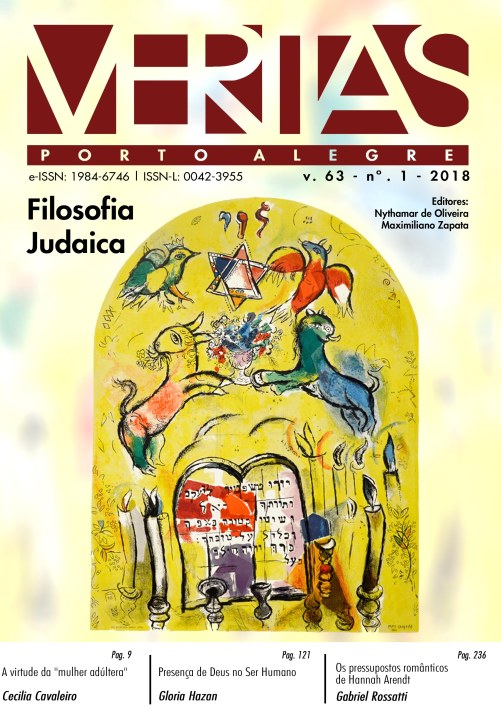Alethic Deflationism and Normativity: A Critique
DOI:
https://doi.org/10.15448/1984-6746.2018.1.29278Palavras-chave:
Normatividade, Deflacionismo Alético, Paul Horwich, Michael Dummett, Filippo Ferrari, Mundo.Resumo
The paper starts by highlighting that virtually nobody would object to claims such as “to regard an assertion or a belief or a thought as true or false is to regard it as being right or wrong”—a claim that shows that truth is intrinsically normative. It is well known that alethic deflationists deny this. Paul Horwich, for instance, maintains that nothing shows that TRUTH is a normative concept in the way that OUGHT is. By relying on a distinction among dimensions of normativity I will try to pinpoint the weakness of Horwich’s argument in the fact that he works with a strong, uncalled-for, interpretation of normativity, whereas a weaker interpretation is more than enough. However, the impression might persist that a different understanding of the normativity of truth on the part of deflationists could eventually show the compatibility between alethic deflationism and normativity. The remaining part of the paper is devoted to contend that this is a wrong impression. Accordingly, it is stated that the normativity exerted by truth is ascribable in the final analysis to the world, and the provocative claim is defended that alethic deflationism lacks the conceptual resources to account for the relation between language and the world.
***Deflacionismo Alético e Normatividade: Uma Crítica***
O artigo começa destacando que praticamente ninguém se opõe a reivindicações como "considerar uma afirmação, uma crença ou um pensamento como verdadeiro ou falso é considerá-lo como correto ou errado" - uma afirmação que mostra que a verdade é intrinsecamente normativa. Sabe-se que os deflacionistas aléticos negam isso. Paul Horwich, por exemplo, sustenta que nada mostra que a verdade é um conceito normativo da maneira que deveria ser. Ao confiar em uma distinção entre as dimensões da normatividade, tentarei identificar a fraqueza do argumento de Horwich no fato de que ele trabalha com uma interpretação de normatividade forte, desnecessária, quando uma interpretação mais fraca seria mais do que suficiente. No entanto, a impressão pode persistir de que uma compreensão diferente da normatividade da verdade por parte dos deflacionistas poderia eventualmente mostrar a compatibilidade entre o deflacionismo e a normatividade alética. A parte restante do artigo dedica-se a afirmar que esta é uma impressão errada. Por conseguinte, afirma-se que a normatividade exercida pela verdade é imputável, em última análise, ao mundo, e a reivindicação provocativa é defendida de que o deflacionismo alético não possui os recursos conceituais para explicar a relação entre a linguagem e o mundo.
Downloads
Referências
Armour-Garb, B.P. and Beall, JC 2005 (eds.), Deflationary Truth, Open Court, Chicago.
Auxier, R.E. and Hahn, L.E. 2007 (eds.), The Philosophy of Michael Dummett, Open Court, Chicago.
Bilgrami, A. 2007, Pursuing an Analogy, in Auxier and Hahn 2007, 383-408.
Cozzo, C. 2014, Is Truth a Chimera?, in From a Heuristic Point of View: Essays in Honour of Carlo Cellucci, E. Ippoliti and C. Cozzo (eds.), Cambridge Scholars Publishing, Newcastle upon Tyne, 107-24.
Dummett, M. 1959, Truth, in Truth and Other Enigmas, Harvard University Press, Cambridge (MA), 1-24.
Dummett, M. 2007, Reply to Wolfgang Künne, in Auxier and Hahn 2007, 345-50.
Ferrari, F. 2016a, Disagreement about Taste and Alethic Suberogation, in “Philosophical Quarterly”, 66, 264, 516-35. DOI: https://doi.org/10.1093/pq/pqv116
Ferrari, F. 2016b, The Value of Minimalist Truth, in “Synthese”, DOI 0.1007/s11229-016-1207-9.
Ferrari, F. 2016c, Relativism, Faultlessness and Parity: Why We Should be Pluralists about Truth’s Normative Function, in “Argumenta”, 2, 1, 77-94.
Horwich, P. 1998, Truth, 2nd Edition, Clarendon Press, Oxford. DOI: https://doi.org/10.1093/0198752237.001.0001
Horwich, P. 2006, The Value of Truth, in “Noûs”, 40, 347-60. DOI: https://doi.org/10.1111/j.0029-4624.2006.00613.x
Horwich, P. 2016a, Wittgenstein on Truth, in “Argumenta”, 2, 1, 95-106.
Horwich, P. 2016b, Is TRUTH a Normative Concept?, in “Synthese”, DOI 10.1007/s11229-016-1208-8. DOI: https://doi.org/10.1007/s11229-016-1208-8
Künne, W. 2007, Two Principles Concerning Truth, in Auxier and Hahn 2007, 315-44.
Leeds, S. 1978, Theories of Reference and Truth, in Armour-Garb and Beall 2005, 33-49.
Lynch, M.P. 2001 (ed.), The Nature of Truth. Classic and Contemporary Perspectives, MIT Press, Cambridge (MA). DOI: https://doi.org/10.7551/mitpress/4884.001.0001
Lynch, M.P. 2009, Truth as One and Many, Clarendon Press, Oxford. DOI: https://doi.org/10.1093/acprof:oso/9780199218738.001.0001
Putnam, H. 1999, The Threefold Cord. Mind, Body, and World, Columbia University Press, New York.
Rorty, R. and Engel, P. 2007, What’s the Use of Truth?, P. Savidan (ed.), New York, Columbia University Press.
Downloads
Publicado
Como Citar
Edição
Seção
Licença
Direitos Autorais
A submissão de originais para a Revista Veritas implica na transferência, pelos autores, dos direitos de publicação. Os direitos autorais para os artigos publicados nesta revista são do autor, com direitos da revista sobre a primeira publicação. Os autores somente poderão utilizar os mesmos resultados em outras publicações indicando claramente a Revista Veritas como o meio da publicação original.
Licença Creative Commons
Exceto onde especificado diferentemente, aplicam-se à matéria publicada neste periódico os termos de uma licença Creative Commons Atribuição 4.0 Internacional, que permite o uso irrestrito, a distribuição e a reprodução em qualquer meio desde que a publicação original seja corretamente citada. Copyright: © 2006-2020 EDIPUCRS






